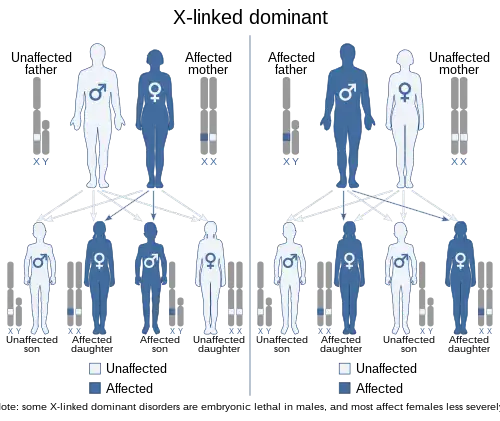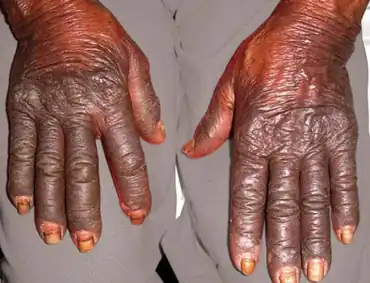Bazex–Dupré–Christol syndrome
| Bazex–Dupré–Christol syndrome | |
|---|---|
| Other names: Bazex syndrome,[1] follicular atrophoderma and basal cell carcinomas[1] | |
 | |
| This condition is inherited in an X-linked dominant manner. | |
Bazex–Dupré–Christol syndrome is a very rare condition inherited in an X-linked dominant fashion. Physical findings typically include follicular atrophoderma, multiple basal cell carcinomas, hypotrichosis, and hypohidrosis.[2]
Signs and symptoms

Clinical presentation of this condition is as follows:[3]
- Atopic dermatitis
- Decreased ability to sweat
- Joint hypermobility
- Narrow nasal ridge
- Sparse hair
- Milia
- Pili torti
- Abnormalities of fingers
- Eczema
- Macrotia
Genetics
BCDS is inherited in an X-linked dominant manner. This means the defective gene responsible for the disorder is located on the X chromosome, and only one copy of the defective gene is sufficient to cause the disorder when inherited from a parent who has the disorder. Males are normally hemizygous for the X chromosome, having only one copy. As a result, X-linked dominant disorders usually show higher expressivity in males than females.
As the X chromosome is one of the sex chromosomes (the other being the Y chromosome), X-linked inheritance is determined by the sex of the parent carrying a specific gene and can often seem complex. This is because, typically, females have two copies of the X-chromosome, while males have only one copy. The difference between dominant and recessive inheritance patterns also plays a role in determining the chances of a child inheriting an X-linked disorder from their parentage.A locus of Xq24-q27 has been described.[4] However, no gene has been identified.
Diagnosis
Genetic testing--x linked dominant pattern associated with various neoplasm (eg. basal cell carcinoma)
Treatment
In terms of the management of this condition involves the following:[3]
- Photoprotection
- Early detection carcinomas
- Surgical intervention
See also
References
- 1 2 Rapini, Ronald P.; Bolognia, Jean L.; Jorizzo, Joseph L. (2007). Dermatology: 2-Volume Set. St. Louis: Mosby. ISBN 978-1-4160-2999-1.
- ↑ Bolognia, J (2008) "Dermatology," Mosby, ISBN 9781416029991.
- 1 2 "Bazex-Dupre-Christol syndrome | Genetic and Rare Diseases Information Center (GARD) – an NCATS Program". rarediseases.info.nih.gov. Archived from the original on 18 March 2021. Retrieved 3 November 2021.
- ↑ Vabres P, Lacombe D, Rabinowitz LG, et al. (July 1995). "The gene for Bazex-Dupré-Christol syndrome maps to chromosome Xq". J. Invest. Dermatol. 105 (1): 87–91. doi:10.1111/1523-1747.ep12313359. PMID 7615983.
External links
| Classification |
|---|